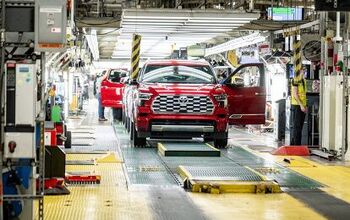QOTD: Will Volkswagen Be Forever Punished for Its SUV Tardiness?
The Nissan Juke and Mini Countryman arrived in the United States in 2010. The Subaru Crosstrek appeared two years later.
Buick’s Encore appeared at U.S. dealers in 2013; its Chevrolet Trax partner the following year. 2015 saw the arrival of the Fiat 500X, Jeep Renegade, Honda HR-V, and Mazda CX-3. The (FWD-only) Toyota C-HR landed in April 2017. The Hyundai Kona was unveiled in June 2017 and will show up in U.S. Hyundai stores this coming winter.
And on August 23, 2017, Volkswagen will unveil the T-Roc, which isn’t likely to go on sale in the United States until 2019. That’s nine years late.
Will the T-Roc’s tardiness cause the subcompact Volkswagen crossover to suffer the marketplace consequences just as its overdue siblings always have?
Remember the (now discontinued) upmarket Volkswagen Touareg’s 2003 appearance? The Mercedes-Benz ML was six years old by that point. The BMW X5 went into production in 1999.
The first Volkswagen Tiguan sale in America occurred in 2008, by which point the Toyota RAV4 was enjoying its 13th model year.
The Volkswagen Atlas arrived in America three months ago, 15 years after the Honda Pilot, which was hardly the family SUV progenitor.
Even if the old Volkswagen Tiguan hangs around, the T-Roc will only increase Volkswagen of America’s SUV/crossover lineup to four vehicles. Toyota markets the 4Runner, C-HR, Highlander, Land Cruiser, RAV4, and Sequoia. Nissan’s current lineup includes the Armada, Juke, Murano, Pathfinder, Rogue, and Rogue Sport. Volkswagen compatriot Mercedes-Benz sells the G, GLA, GLC, GLE, and GLS, plus an additional bodystyle for both the GLC and GLE.
More by Timothy Cain


































Comments
Join the conversation
I think if anything, VW will be punished for its SUVs without diesel engines. The TSI is a good engine, but it's not much engine to push the Atlas around. The next generation Tiguan was supposed to get a TDI, but obviously that's not happening so GM and Mazda are picking up the slack.
Of all the things Volkswagen could be punished for, a late rollout of a SUV is pretty far down the list.
I'm not sure 'punish' is the right word. This is the natural course of a business that is out of step with the market's needs. Toyota, Honda, and to a lesser degree Nissan, and Mazda (via its former relationship with Ford) took a long term view of building their brands in the US, and have long offered vehicles that make sense in North America, sometimes even making vehicles JUST for North America. Their American divisions built manufacturing plants here, and design cars that make sense here based on feedback from their customers and dealers. From the outside looking in, it appears that VW is far more 'top down' in its structure, with all decisions made in Germany, after a slow up the chain, down the chain process for any feedback....which is often rejected. Their inability to ever offer any type of truck at all in the US, when they currently have such a vehicle in their global stable is insane. It's only the number one volume (and profit) segment in the US market. Why would you ignore it VW? Toyota slowly made their way in, and now the Tacoma is the sales leader in its segment. The only ones punishing VW's American arm is VAG itself.
On its home turf, Volkswagen has been notorious for being late to the game, then winning it anyway. The Golf was not the first transversally-engined small hatchback, the Passat was not the first large (for here) fastback (back then), the T4 Transporter/Caravelle was the last of the vans to go to the now-standard short-nosed layout; both the old pick-up Caddy and the new highroof microvan one, as well as the Sharan, Touran, Touareg, and Tiguan were all late to their respective segments. Hasn't hurt them a bit here. Except for the Touareg and maybe Sharan, they all are or were segment leaders in Germany, some even in the whole of Europe. They're just not made for the US; they seem to be just too expensive to compete there. Here, no-one is surprised when a VW costs a few grand more than its imported or GM/Ford-branded competition; hasn't hurt them a bit, either. After all, for the more frugal customer, there's always Skoda and Seat. Surely it makes sense to re-use the last generation's components (suspension and such), make somewhat bigger bodies around that, build 'em cheaply over there and sell them to Americans. That's actually pretty much the Skoda recipe gone stateside, which is why I don't think you'll be getting those: you already have something like it, only that it's called Volkswagen there.